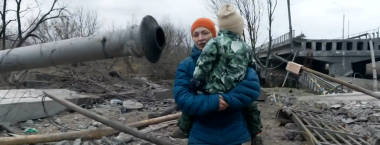
Statement of Human Rights Organizations Regarding Conviction of Crimean Activist Bohdan Ziza
On June 6, 2023, the Southern Area Military Court of Rostov-na-Donu sentenced Mr.Bohdan Ziza, a...
08 June 2023
UHHRU’s Strategic Litigation Center lawyer Alina Pavliuk on investigation of war crimes that requires special procedure and conditions in the nowadays Ukraine
The United Nations Monitoring Mission in Ukraine periodically mentions issues on human rights violations and the use of effective mechanisms for their protection in its reports. Thus, the latest report on the period from November 16, 2017 to February 15, 2018 states: “… Furthermore, in conflict-related investigations and proceedings, OHCHR observed an unwillingness, both within law enforcement institutions and politically, to effectively investigate human rights violations alleged to have been perpetrated by State actors …” Although such allegations arise from specific situations and cases, this does not disprove the existence of more general, systemic problems in the area of investigations. Let us take a closer look.
When it comes to classifying crimes, the Criminal Code of Ukraine provides little room for maneuver as regards the events in the east of Ukraine. If we consider crimes in the context of the armed conflict, it will involve two articles of the Criminal Code: Art. 437 Planning, Preparation, Initiation and Conduct of a War of Aggression and Art. 438 Violation of the Laws and Customs of War. At present, they are workable when conducting investigations. Of course, they include less than a third of the war crimes mentioned in Article 8 of the Rome Statute of the International Criminal Court, but it’s still some basis for the work of law enforcement bodies (see information on the position of the International Criminal Court regarding the situation in the east of Ukraine in the previous post: /blogs/rozhlyad-sytuatsiji-v-ukrajini-mizhnarodnym-kryminalnym-sudom/).
Speaking of Russia’s aggression in eastern Ukraine, these are the articles we must base our further work on. However, there’s an antiterrorist operation going on in Ukraine since 2014, so we have a rather unusual situation when it comes to law enforcement, which involves the articles of Ukraine’s Criminal Code on the prohibition of terrorist activities (Art. 258 – 258-5). Thus, here are extracts from the verdict of the Sloviansk City District Court of Donetsk Oblast:
“… Also, PERSON_2, from mid-August 2014 to February 14, 2015, acting deliberately, with the same motives and goals, acting as an accomplice in conducting an aggressive war against the state of Ukraine, upon collusion with a group of persons, with the aim of forcibly changing the borders of Ukraine, acting as part of the so-called “Special Commandant’s Regiment ‘Kramatorskyi’ “(military unit 08826, Donetsk) of the 1st Army Corps of the People’s Militia of the “DPR”, being on the premises of the Office of the Security Service of Ukraine in Donetsk Oblast (Donetsk, 62 Shchorsa St.), together with other unidentified members of the terrorist organization “DPR”, performing assigned duties, obstructing the antiterrorist operation and the fight against the armed aggression of the Russian Federation, was illegally holding in detention and keeping under armed guard servicemen of the Armed Forces of Ukraine …
… After questioning the accused PERSON_2 and studying the case file of the criminal proceeding, the panel of judges came to the conclusion that the guilt of the accused PERSON_35 for the criminal offenses, namely under part 1 of Art. 258-3 of the Criminal Code of Ukraine, i.e. participation in a terrorist organization; part 5 of Art. 27, part 2 of Art. 28, part 2 of Art. 437 of the Criminal Code of Ukraine, i.e. aiding in the conduct of an aggressive war upon collusion with a group of persons; under part 1 of Art. 438 of the Criminal Code of Ukraine, i.e. cruel treatment of prisoners of war – has been established, and the pre-trial investigation body correctly and reasonably classified the actions of the accused PERSON_2 under these articles of the Criminal Code of Ukraine …”
This verdict is quite indicative for the practice of war crimes investigations in Ukraine due to the following reasons:
Then there is the issue of jurisdiction. On September 3, 2015 a separate specialized Bureau for the Investigation of Crimes against Peace and Security of Humanity and International Crimes was established within the Main Military Prosecutor’s Office of the General Prosecutor’s Office of Ukraine. Despite limited resources, with only 34 people on staff, according to official data, including investigators, prosecutors and procedural workers, the Bureau quite effectively investigates instances of illegal detention of persons, use of torture, extrajudicial executions and destruction of dwellings, and collects evidence of Russia’s aggression in Ukraine. The Bureau’s concept and goals are laudable, but practice remains ineffective: reports of disappearances in uncontrolled territories and deaths as a result of artillery attacks are registered by territorial bodies of the National Police of Ukraine. In addition, the United Center for Coordinating Searches, Negotiating the Release of Illegally Imprisoned Persons and Hostages and Locating Persons Gone Missing in the Antiterrorist Operation Zone under the Security Service of Ukraine refuses to register reports on captured persons without a corresponding report submitted to a territorial body of the National Police. These proceedings are carried out under the common crime laws of the Criminal Code, that is, not as crimes committed in the course of hostilities. As a result, such complains are accumulated by various departments with no hope for effective investigation. It would be more expedient to gather all cases concerning the armed conflict under the jurisdiction of the above-mentioned Bureau, but then the question will be whether the Bureau is going to have a sufficient amount of resources to conduct all necessary investigations.
Let us consider the situation with captives. Over 3,000 people went through captivity during the conflict in eastern Ukraine. Each of them needs to be interviewed and declared a victim in a separate proceeding. In doing so, it is necessary to find out a full description of the criminals and conditions of the people’s captivity. Also, those subjected to bodily harm must undergo a medical examination in order to confirm the injuries. And that’s for each crime in a potential series. The same person can be a victim in several proceedings – for instance, when a person went through captivity and witnessed the invasion of the Russian army into Ukrainian territory – and all these facts must be timely recorded. At present, investigators work together well enough when they need to interview one victim about different incidents. But we also have people with whom no one talked since 2014, or whose testimonies were deemed uninformative by the Security Service. When it’s been three years since an incident and the victim is yet to be summoned and interviewed, it makes people forget important details and lose trust for the investigators. Simply put, the Bureau is physically unable to service everyone. Naturally, it is easier for the investigator to interview a victim when having a general idea of what the victim went through, than to send an assignment to a region and receive a formal reply with the same uninformative results. Local investigators are not familiar with the general course of investigations, and they lack skills necessary to properly interview victims of war crimes. That is how the situation with available resources looks like. Unfortunately, it is compounded even further by legislative issues.
Recent changes to the criminal procedure law are also not conducive to effective investigation of war crimes. In particular, those regarding the period of pre-trial investigations (part 3 of Art. 294 of the Criminal Procedure Code of Ukraine – If, from the day of a person’s notification as to the suspicion of committing an offense, pre-trial investigation can not be completed in the time specified in clause 2, paragraph 3, part 1 of Art. 219 of this Code, it may be extended within the terms established by clauses 2 and 3, part 2 of Art. 219 of this Code: up to twelve months, by the investigating judge, at the request of the investigator, upon approval by the Prosecutor General or his deputies) or the conduct of procedural actions. The absurdity of the situation becomes evident in the context of criminal proceedings with three thousand victims that have gone through captivity, hundreds of suspects and no access to crime scenes. Investigation of war crimes requires special procedure and conditions, not trying to adjust to conventional crime proceedings.
In addition, it is worth recalling Art. 3 of the Law of Ukraine On the Special Procedure of Local Self-Government in Certain Territories of Donetsk and Luhansk Oblasts, according to which “the State guarantees, in accordance with the law, no criminal or administrative liability or punishment for persons participating in the events in the territory of Donetsk and Luhansk oblasts…” It is yet unclear how this provision is going to be executed, as the possibility of amnesty is already laid down in Ukrainian law, so it‘s a question for the future – how it will be used.
Any crime is a matter of evidence. During an armed conflict, evidence becomes all the more valuable due to the complex circumstances of the acts, the nature of violations, their scale and cruelty. If a state faces new challenges with regulating public relations, the legal system must respond to these challenges accordingly. So far, this hasn’t been the case for crimes committed in eastern Ukraine. Evidence is not systemic enough, information records are not kept sufficiently well. The results of investigations of war crimes must lay the groundwork for Ukraine’s position in the European Court of Human Rights, International Court of Justice and International Criminal Court. Each reported violation must be supported by proper evidence so that no doubts could arise. And that’s why it is important to adhere to the requirements of these international bodies when collecting evidence.
Prepared by Alina Pavliuk (UHHRU)
Photo RadioSvoboda.org
If you find an error on our site, please select the incorrect text and press ctrl-enter.

On June 6, 2023, the Southern Area Military Court of Rostov-na-Donu sentenced Mr.Bohdan Ziza, a...
08 June 2023

Ukraine’s latest request to the European Court of Human Rights (ECtHR) to order Russia to...
07 September 2022

The family, twice refugees, ask for help from UHHRU – in 2014, the spouses Yarovoy...
27 May 2022
They were deported to russia, but there was no way to leave it. The parents...
21 April 2022